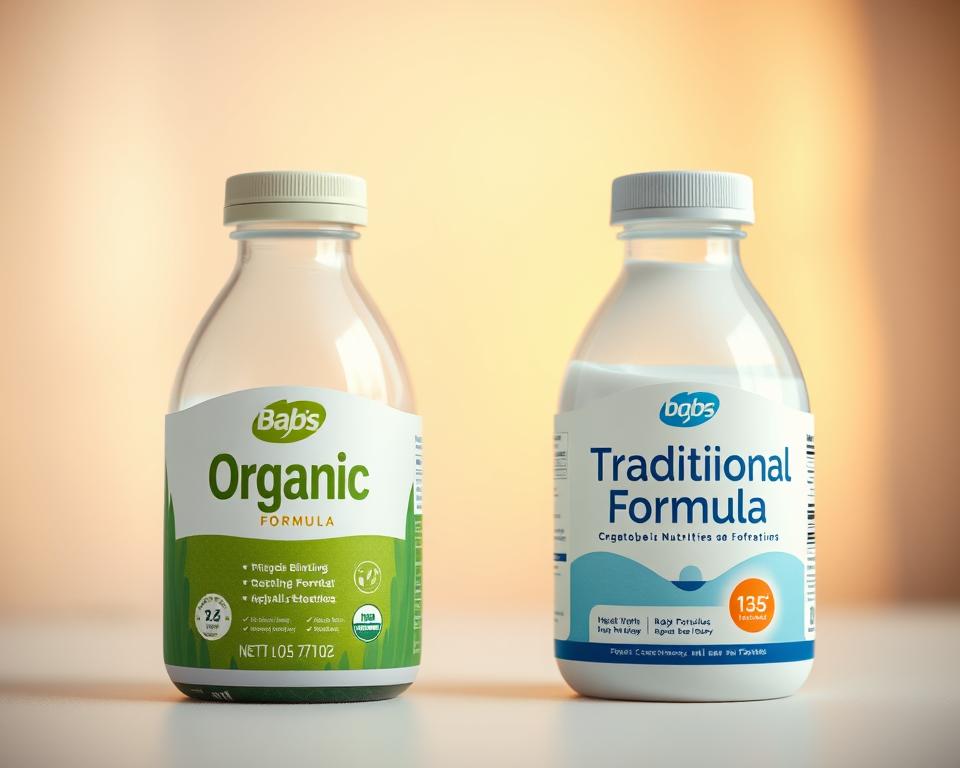Discover Top Organic Infant Formulas: Parental Handbook
Almost eight in ten U.S. moms and dads rely on formula during their baby’s first year. Lactation difficulties frequently cause this shift. Choosing the right best newborn formula organic is essential for these families. This resource supports parents in selecting top organic options for infant nutrition.
We’ll review key brands and blends with an eye on purity and nutrients. These insights are critical for a wholesome infant beginning.
Choosing the right food for your baby is a critical decision for every parent. Organic infant formula has gained popularity due to its focus on organic ingredients. It provides a healthier option for infants. By excluding chemical residues, they ensure a safer early diet.
Caregivers now prioritize non-GMO, additive-free options. Such concerns drive the trend toward organic as a safer nutritional path.
Benefits of Organic Ingredients
Choosing organic constituents yields key benefits. They undergo strict testing for superior quality and protected safety. By opting for organic infant formula, parents can rest assured that their child is consuming food free from harmful substances.
The cultivation processes involved in organic farming emphasize sustainability and environmental preservation. This reinforces benefits that extend beyond dietary choices.
Related Developmental Gains
Organic nutrition often supports better infant growth outcomes. Evidence indicates organics can reduce digestive upset and allergy chances. The absence of chemicals underpins these positive effects.
Parents find comfort in knowing that organic options provide balanced nutrition. They support both growth and overall wellness for their babies.

Top Qualities of Organic Infant Formulas
Choosing the best organic baby formula is a critical decision for a baby’s health. Assess protein types alongside key nutritional elements. How proteins are sourced and balanced impacts digestion and nourishment. Also, knowing the essential nutrients ensures your baby gets the best support for growth and development.
Whey vs. Casein Balance
Whey and casein form the protein base in many formulas. Whey breaks down quickly and casein releases nutrients gradually. More whey generally equals gentler digestion for infants. Many organic options boost whey content for digestive comfort. Choose products that specify their protein blend and proper proportions.
Vital Additives and Health Boosters
Critical nutrients make a big difference in formula selection. DHA/ARA essential for cognitive and ocular growth. Including prebiotics helps establish gut flora and immunity. Verify the presence of these compounds for comprehensive nutrition. Organic formulas that focus on these nutrients offer a rich source of nutrition.
| Protein Source | Benefits | Whey-to-Casein Ratio |
|---|---|---|
| Whey | Easier digestibility|Gentle on tummies|Quick absorption | Higher ratio is better|Lean whey blend preferred|Above 60% ideal |
| Casein | Slow release of nutrients|Sustained nourishment|Stomach-friendly over time | Lower ratio preferred in early months|Casein kept minimal|Around 40% or less |
Leading Organic Formula Labels
Caregivers frequently choose reputable names for organic formula. Below are notable labels and what makes them special. Leaders in USDA-certified organics, they meet distinct caregiver expectations.
Kendamil Whole Milk Formula
As the sole whole-milk organic formula, Kendamil stands out. Enjoy its luscious consistency free from unwanted chemicals. It’s a top pick for parents who value purity in their baby’s diet. You can easily purchase Kendamil with a few clicks.
HiPP’s Combiotik for Delicate Digestions
Engineered for delicate tummies, HiPP Combiotik minimizes distress. It includes prebiotics and probiotics for better digestion. Parents often choose HiPP for its commitment to organic, high-quality ingredients, making it a favorite in organic baby food shops.
Holle’s Biodynamic Organic Formula
Famed for biodynamic standards, Holle Bio ensures top-quality organics. Strict testing and eco-focused practices define its excellence. Parents trust Holle for its authentic taste and nutrition.
Aussie Bubs’ Pasture-Fed Formula
Its grass-fed milk basis boosts vitamins and minerals naturally. It offers organic ingredients that align with a natural feeding philosophy. Its unique approach makes it easy for parents to spot quality in organic baby formulas.
Bobbie’s Contemporary Organic Blend
Bobbie is at the forefront of baby nutrition, blending modernity with thoughtful formulation. Balances modern nutrition science with certified organics. Parents value Bobbie’s nutritional approach as they navigate baby feeding.
Choosing the right organic formula for your baby requires careful thought about their dietary needs. Recognizing food sensitivities helps you avoid tummy troubles. Formula makeup plays a huge role in easing infant digestion.
Identifying Feeding Intolerances
Infants can respond poorly to lactose or intact proteins. Look for formulas designed for sensitive infants. For instance, organic formulas for sensitive tummies often have less lactose or proteins that are partially hydrolyzed. They help alleviate discomfort and support healthy digestion.
Seek medical advice to confirm the best feeding option.
Focusing on Tummy Comfort
Ease of digestion hinges on selecting a formula made for comfort. Formulas enriched with prebiotics and probiotics aim to boost digestive comfort. They help in developing a healthy gut flora, improving digestion and nutrient absorption.
Mothers supplementing with formula can find options mimicking breast milk nutrients.
How to Transition to Organic Baby Formula
You can transition infants from breastfeeding or standard formula to organic smoothly. Knowing the right approach helps both caregiver and infant adjust. Gradual changes are key to a smooth transition and help your baby accept the organic formula.
Phased Introduction
Begin with small amounts of organics mixed in. Use this plan for the gentlest switch:
- Mix ¼ organic into ¾ existing formula to start.
- Over the next week, gradually increase the proportion of organic formula while decreasing the traditional formula.
- Watch for fussiness or digestion changes and adjust pace as needed.
- Serve the new formula during calm periods so baby links it with comfort.
- Maintain regular feeding schedules to aid adaptation.
Indicators of Successful Switching
As you navigate this transition, recognizing signs of good acceptance will provide reassurance:
- Baby nurses or bottles quietly and contentedly.
- Normal poops and easy digestion continue.
- Eating habits remain largely unchanged.
- Infant seems satisfied and relaxed post-feeding.
Patience pays off—look for these signs for a favorable outcome.
Organic Baby Formula vs. Traditional Formula
Many parents are torn between organic baby formula and traditional formula when it comes to their infant’s nutrition. Making the right pick ensures optimal nutrition for little ones. Priority on safe elements and developmental advantages leads the selection.
Ingredient Differences
Ingredient lists mark the key divergence between organics and regular formulas. They feature only certified organic elements, omitting artificial chemicals. Brands like HiPP and Kendamil use organic milk and other ingredients from sustainable farms. Regular formulas can pack artificial additives and GMO-derived compounds. This highlights the organic formulas’ focus on natural, wholesome nutrition.
Cost Comparison
The price of organic baby formula often reflects the higher standards for ingredient sourcing and production. Organic formulas are generally pricier than traditional ones due to the costs of organic certification. Caregivers often deem the extra expense justified by wellness gains. Understanding the price and perceived value helps parents make a choice that fits their budget and values.
Digital retailers have transformed organic formula purchasing. Now, they can purchase top-notch formulas from home. Online options cover everything from hypoallergenic to grass-fed blends.
Benefits of Online Shopping
Online shopping brings numerous benefits for parents with hectic schedules. Convenience: Order from anywhere without the need to visit a store.
- Ease of access
- Variety: Explore an extensive selection of organic baby formulas across different brands
- Online deals and sales help reduce costs
Subscription Services Explained
Infant formula subscription services have become increasingly popular. Set-and-forget deliveries ensure you never run out.
Subscription plans typically offer these perks:
- Never worry about restocking
- Adjust timing to fit your usage patterns
- Subscription rates often beat retail prices
Regulatory Standards for Organic Baby Formulas
Guaranteeing formula purity demands robust regulation. A web of rules ensures product safety and authenticity. Parents can rest assured knowing that FDA regulations on infant formula ensure safety. Organic labels backed by USDA verify farm-to-formula purity. Understanding these standards empowers parents to make informed choices for their infants.
Federal Formula Guidelines
U.S. FDA controls critical aspects of formula manufacturing. They mandate specific vitamin, mineral, and protein levels plus allowable additives. These mandates secure infant dietary adequacy. Main elements are:
- Mandatory ingredient listings|Required ingredient disclosures|Compulsory component labeling
- Specific nutrient requirements such as protein, fats, and vitamins|Defined macro- and micronutrient thresholds|Preset nutrition minimums
- Comprehensive quality control measures during manufacturing|Rigorous production inspections|Stringent safety checks
Following these rules means infants receive only approved formulas.
USDA Organic Requirements
The USDA organic certification is a critical indicator of quality and purity in organic baby formulas. The certification process involves several essential criteria. Key criteria include:
- Proof that ingredients are produced without synthetic fertilizers or pesticides|No chemical fertilizers or sprays used|Farm inputs must be 100% natural
- Verification of non-GMO (genetically modified organism) status|Guarantee of GMO-free sourcing|Strict non-GMO testing
- Clear guidelines on the handling and processing of organic products|Protected organic integrity during production|Certified organic processing rules
USDA label confirms field-to-formula organics. These standards deliver safer, nutrient-rich formulas. The combination of USDA certification with FDA regulations provides parents with confidence in their baby’s nutrition.
| Regulatory Aspect | Description |
|---|---|
| FDA Regulations | Sets safety and nutrient standards for infant formula |
| USDA Organic Certification | Ensures organic ingredients are grown without harmful substances |
| Quality Control | Mandatory checks during production processes |
| Ingredient Transparency | Clear labeling of all components for consumer knowledge |
Buying Guide for Organic Formulas
Selecting the optimal organic formula might feel overwhelming. However, these pointers help caregivers choose with confidence. Understanding retailers and label terminology streamlines the choice.
Top Online Retailers
Multiple web shops carry extensive organic formula lines. You’ll find periodic discounts online. Consider these popular options:
- Amazon – Known for its wide variety and fast shipping
- Target – Provides flexible shipping and pickup services
- Walmart – Provides both online shopping and local availability
- Thrive Market – Focuses on health-conscious products, including organic options
Check user feedback and ratings first. They help assess the product’s quality and the retailer’s reliability.
Understanding Labeling and Certifications
Knowing label terminology ensures you get true organics. Look for certifications that confirm the product’s organic status. Common ones include:
| Certification | Description |
|---|---|
| USDA Organic | Indicates the formula contains at least 95% organic ingredients |
| Non-GMO Project Verified | Means the formula does not use genetically modified organisms |
| European Union Organic | Denotes adherence to EU organic farming regulations |
Knowing these certifications ensures the formula is not only nutritious but also safe for your baby.
In Summary
In summary, the right organic choice shapes infant wellness significantly. Organic baby food offers more than just ingredients; it ensures your child’s overall well being. Your baby receives balanced nourishment free from chemicals. Parents have discovered key factors to consider, such as protein sources, dietary sensitivities, and the reputation of brands like Kendamil, HiPP Combiotik, and Holle Bio.
Our guide underscored customizing choices to your baby’s health. Moving to organic formulas calls for a stepwise plan. Incremental change safeguards digestive ease.
Guided by these pointers, you’ll choose with confidence from many choices. Investing in organic baby formula supports your child’s growth and sets the stage for a lifetime of healthy eating habits. Remain committed to offering the best start in life. Empower early eating habits with carefully selected organics.

